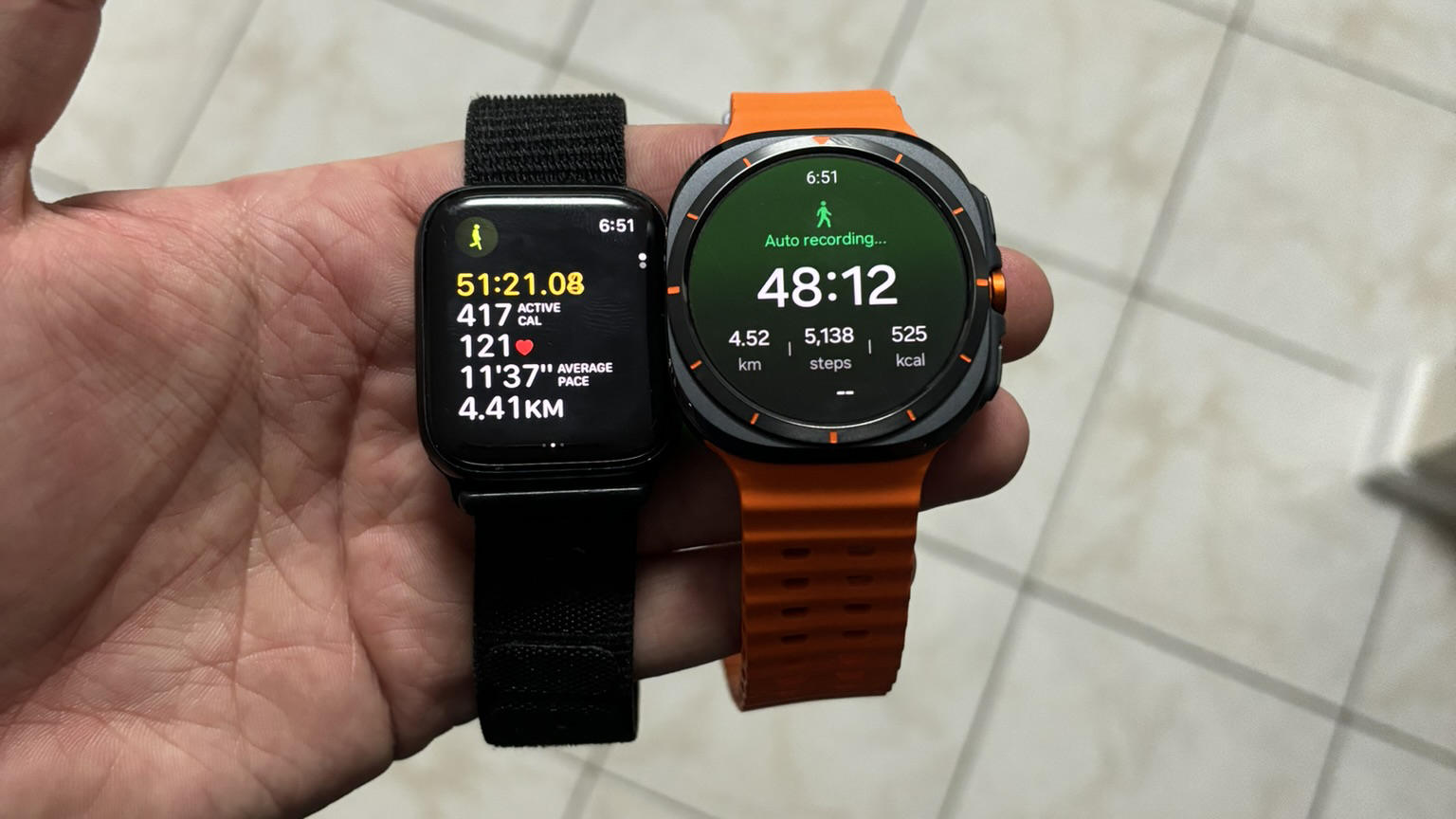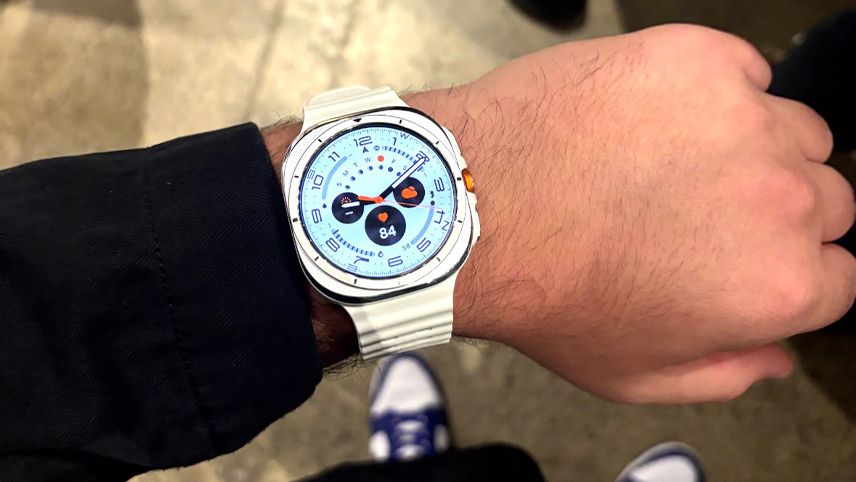I’m not a novice when it comes to health and fitness, and I’m fully clued up with the latest in wearables that monitor activity. I exercise regularly, love lifting weights and try to exceed 10K steps on a daily basis. I’ve also had a smartwatch or fitness tracker on my wrist almost every day for the last five years.I started out trying a number of Fitbit models, including the Charge 4 and Charge 5, as well as the Fitbit Ionic. But since switching to my current Apple Watch SE 2, I haven’t felt the need to take it off.
Despite my experience with fitness watches, I haven’t yet felt the need to try out a dedicated sports watch, like one of the best Garmin watches, or cash in on the more recent craze for an ‘ultra’ wearable. For my needs, they’re overkill. Then I was offered the chance to try out the Samsung Galaxy Watch Ultra for a few days. I wasn’t quite sure what I’d get out of the experience but, at the very least, I figured it could be just the thing to shift my mental state and push me to get more out of my workouts. Hey, maybe it could turn me into a proper athlete!
And the Samsung Galaxy Watch Ultra tries to do that right from the get go. How? For starters, its big, bright, orange action button doesn’t automatically send you to the walking page – it goes straight to ‘Multisport’ where you can begin a Triathlon, Duathlon and Aquathlon. This let me know immediately that the Galaxy Watch Ultra was above my pay grade, as I have no intention of doing any kind of athlon anytime soon.
But I still had hopes that the Galaxy Watch Ultra could at least motivate me more than my current Apple Watch can and really elevate my health and activity. It achieved that goal, in large part to its daily energy score.
Making better choices
At this point I feel like I need to introduce you to a very different kind of fitness tracker. It’s called Whoop and we’ve discovered that Prince William is a fan. It has no screen or display, and uses sleep, recovery, performance analysis and scores to help you get more from your workouts. The prospect of this data has almost sucked me in plenty of times as it’s something I don’t get from Apple’s Fitness app – although I certainly don’t need to know what my ‘strain’ score is. Maybe it’s all the RPGs I’ve played, but there’s something very pleasing about a number telling me how good I am going to feel and perform on that day.
The Galaxy Watch Ultra follows a similar philosophy by providing me with a sleep score and a Daily Energy Score. The former is a rating of the past night’s sleep based on five factors: sleep time average, physical recovery, restfulness, mental recovery and number of sleep cycles. For reference, Samsung says that a score of 85-100 is a healthy sleep, while my score of 84 is 11 points better than my age’s average, with a score of below 75 being cause for more focus on improving sleep quality.
Now, the daily energy score uses this sleep analysis, your activity levels and heart rate to provide a daily score for your physical and mental energy, and general readiness. And this was the most useful feature of the Galaxy Watch Ultra that I wish I could get on my Apple Watch – I found it helped me stay aware of how my body was feeling and make better choices based off of it.
As to how accurate it is… well, I had days where I thought it was bang on, and other days where I felt that the score didn’t reflect how I was feeling. Nonetheless, I was certainly considering my sleep, energy levels and potential activity more than usual. And, while I can see an athlete following it perfectly, maximizing their sleep, easing up their training when they haven’t recovered well and really nailing their goals… I, of course, rarely listened to it.

A personal trainer on my wrist
When I woke up groggy after staying up to watch the Olympics and both my scores were below 70, that wasn’t a shock. I didn’t need my watch to tell me I was feeling tired or hadn’t gotten enough sleep – being lured to the coffee machine like a zombie did that. It’s not exactly the same as wearing a nagging parent on your wrist, but it’s not too far off.
I did manage to find the Galaxy Watch Ultra useful in other ways, however. When I did go to the gym, it was like having a personal trainer. The information it provides is clear, helpful and easily read on its large, vibrant display. But what I loved about this watch was the ability to input my own custom workouts, which is a great feature as the default library of exercises isn’t as extensive as I would have liked. From a timed warm-up to rep goals, weights, sets, rest timers and breaks between each exercise, the Galaxy Watch Ultra had me hitting chest day like no fitness watch ever before. Better yet, the custom workout can be added to the action button.
I also appreciated the fact that it also kept me on track far better than other fitness devices I’ve used with little prompts and reminders that were helpful without being annoying. Once you understand what each swipe of your finger does, it’s incredibly easy to navigate and the provided information – like heart rate zones, calories burned, peak heart rate and any goals you’ve added – is easily found without the device constantly blaring at you.
Back to basics
I wanted the Galaxy Watch Ultra to elevate and improve my exercise performance and, in the short time I spent with it, I did just that. But I’m not an athlete who needs to go through my workout with a fine-tooth comb. If I want to improve my deadlift, do I really need a $649 / £599 / AU$1,299 wearable?
Honestly, my Apple Watch SE is more than enough for my personal needs. Sure, I don’t get all the bells and whistles, but there’s more than enough fitness and health information available to keep the average user on track.
There’s something else I learnt during my time with the Galaxy Watch Ultra – something I didn’t realize would mean much to me – the accuracy of the readings each of these wearables provided. Now, as an athlete (pro or otherwise), you want as accurate data as possible, but I found that I really didn’t care. All kudos to Samsung for making a wearable that, to me, seemed to be more accurate than the Apple Watch SE, but sue me for not caring that much! I’m perfectly fine with my step count being about a few steps off or thinking I burnt 200 calories when I really only spent 180 – for the average person like me, that doesn’t make a world of difference.
While I’ll be sticking with Apple Watch SE, this isn’t an Apple vs Samsung debate. It’s about buying a product that is perfect for me – the Apple Watch SE was at a price that suited my budget, and tracks what I need. It also helps that I am an iPhone user. If you need a smartwatch with the durability, power and long-lasting battery for your 10-hour runs, multi-day hikes, diving, rock climbing or any other ultra event in extreme conditions, the Galaxy Watch Ultra will pay for itself.
If you’re a Samsung user that wants a smartwatch to track your daily activity, provide sleep analysis and give a tantalizing daily score, the Galaxy Watch 7 is probably the better choice – providing more than enough functionality for the average person at a price that won’t blow out your budget. I loved my time with the Galaxy Watch Ultra, and it made me wish I could take full advantage of what it offered, but having it on my wrist is like keeping a Ferrari under 40km/h – so my Apple Watch SE is firmly back on my wrist.

